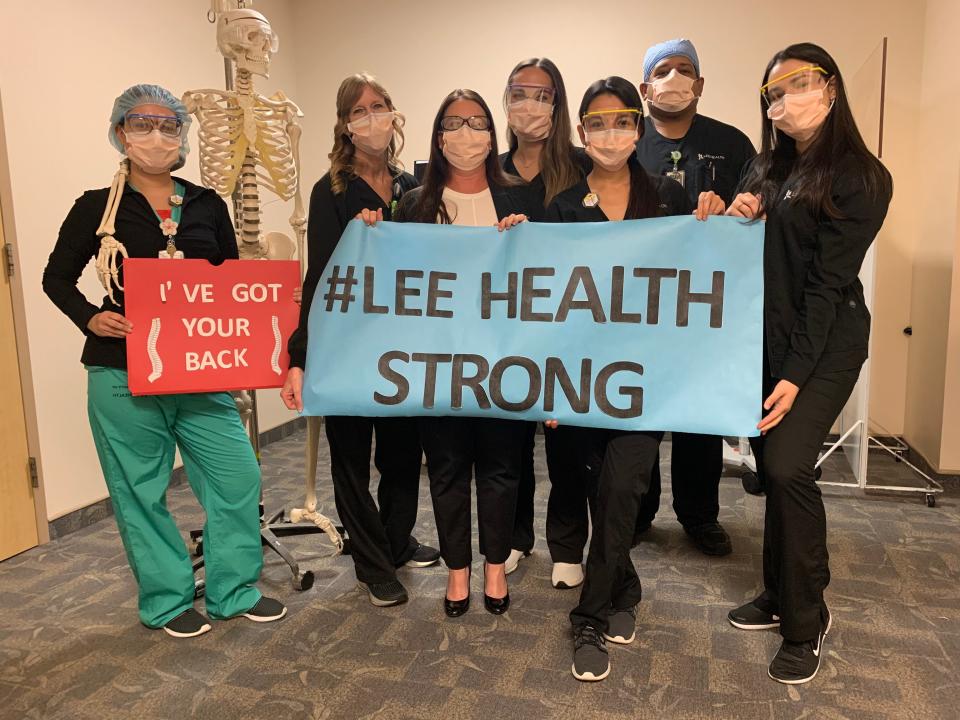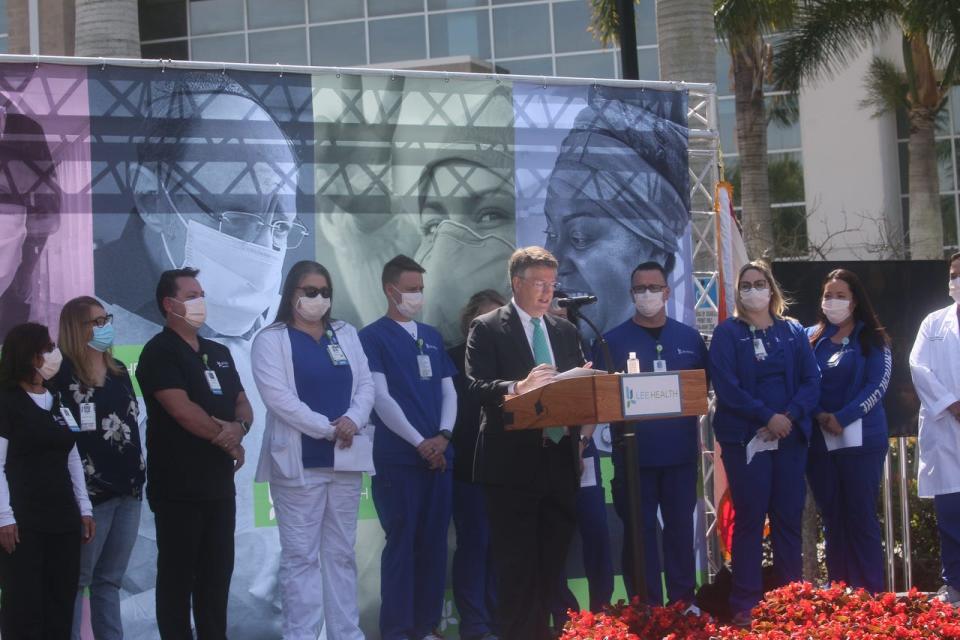Florida attorney general asked to investigate Lee Health. What to know
A physician has asked the Florida attorney general to investigate Lee Health’s failure to provide the public with an accounting of assets and liabilities.
Dr. Raymond Kordonowy sent his request to Ashley Moody’s office three business days after leaders of the public hospital system with a $3 billion operating budget voted to become a private nonprofit system.
The elected board’s decision June 13 culminates months of deliberations on how to remain competitive in a rapidly changing marketplace.
Deep-pocketed for-profit hospitals are free to build anywhere in Florida since a regulation was dropped in 2019 and private equity firms are investing in outpatient based specialty services.
Kordonowy has gone back and forth with the attorney general's office and was told recently it is not within their jurisdiction.
He nonetheless is asking the state's top attorney to follow the privatization effort as it moves forward. It still needs approval from Lee County leaders.
More: Lee Health leaders vote to become private hospital. Will patients see much difference?
As a public system with a large charity care patient base, Lee Health leaders say the decision to convert opens up new business opportunities.
It also will eliminate having to operate under the state’s Sunshine Law of open meetings and records which enables competitors to access financials and strategic plans.
As a public system, Lee Health is a safety net provider caring for all patients regardless of ability to pay yet it has no tax levy to help offset the expense. The drafted documents for the conversion says the charity care mission will be maintained as a private nonprofit entity.
More: Citizen petition calls for audit of Lee Health assets. What you need to know
The next step is forging an agreement with the Lee County Commission which must be done by late October. The current Lee Health board plans to remain in charge of the new nonprofit entity on an interim basis and an oversight board would be established.
What is the doctor asking of the state attorney?
Kordonowy, an internist in private practice and watchdog over the conversion talks, asked the attorney general to review an amendment to the public system’s enabling act which the Florida Legislature approved in 2023.
The amendment allowed Lee Health to explore converting from a public system to a private nonprofit entity and detailed all the steps that must be followed.

Specifically he points to language that says Lee Health must provide a full accounting of assets and liabilities in the agreement between the hospital system and the county for the conversion to proceed.
“I am asking the State Attorney to review the act and to inform Lee Health and the county commissioners that they have a legislated duty to provide the public with a full accounting of all assets, liabilities as well as the plan for how transferring to a non-public, private nonprofit entity will be handled,” he wrote in his initial request to Moody’s office.
“I further request your office follow this process to assure the prescribed legislation is properly followed,” he said.
Kordonowy said the attorney general's office responded by referring him to Lee Health's financial statements.
"I rebutted that is not a stated list of companies held under Lee Health's structure which I believe the public needs to know," he said in an email.

Kordonowy says the residents of Lee own the assets of Lee Health and they need to know what they are giving away to a new nonprofit entity and what the cost implications are.
At the board’s June 13th meeting ahead of the vote to go private, Kordonowy was addressing the board on the issue of assets and Lee Health’s requirements. He ran out of the allotted five minutes given to public speakers before he finished and was cut off.
He has been circulating a petition that has 117 signatures since of residents since mid-June wanting a full disclosure of Lee Health’s assets by item and business relationships by contract.
He included the petition details in his correspondence to the state attorney general’s office.
The petition states, in part, that it is possible that the public would be better served by diminishing Lee Health’s current assets and allow for a sale of assets to other market participants.
“This petition is seeking signatures to show the board and the Lee county commission the level of public interest in gaining this information,” according to the petition. “Further, the signatures represent an interest in an honest assessment of how taking an alternative path as suggested would benefit and or potentially harm the public.”
Kordonowy said recently that Moody's office had not had time yet to review his request. In addition, Lee Health had not been made aware he had contacted the state attorney general’s office.
When asked to respond to Kordonowy’s request to the state attorney general, Lee Health spokeswoman Mary Briggs said in an email:
“The enabling act clearly outlines what Lee Health needs to do during the conversion evaluation process, and we're fully compliant with these legal requirements. This includes providing a description of our assets and liabilities in the finalized mission agreement.”
Briggs said more details all of Lee Health’s assets and liabilities are available at the website. According to its financial statement for the fiscal year ended Sept. 30, 2023, the hospital system had $3.7 billion in assets and $1.4 billion in liabilities.
Was this discussed earlier?
The issue of having a full accounting of assets was raised at a Lee Health meeting in February by board member Therese Everly. It was at that meeting when consultants Kaufman Hall presented its detailed assessment of the pros and cons of a conversion, and recommended the board continue exploring it.
The response given to Everly’s request was that such an audit is only required when a sale is being considered, which is not the case.
Everly ultimately was the only board member who voted against going forward with the conversion. She cited numerous concerns that includes the loss of sovereign immunity protection against large medical malpractice claims and spending $5.3 million more to compensate for the malpractice change which may not go far enough.
Another issue for Everly is an estimated short-term loss of $60 million in special payments as a public safety net hospital and unknowns with changes required to 35 charitable clinics. Everly also cited unknowns at this juncture of refinancing $770 million in debt that will be necessary.
A 10-year projection starting in 2025 shows Lee Health’s net patient revenue at $34.5 billion if it stays as a public hospital. It would jump to $35.5 billion with the conversion to a private nonprofit. That would be a gain of $1 billion over the 10-year forecast, according to projections by Ben Spence, Lee Health’s chief financial officer.
Why go private?
With a $3 billion annual operating budget, Lee Health is one of the largest public systems in the United States and Florida. It has a large charity care and Medicaid patient base as a safety net system.
Last year it provided $179 million in “community benefits” to residents, which includes charity care, after foregone taxes of nearly $94 million.
With 1,865 beds at four acute care hospitals, one million patients are seen annually with 85,000 admissions and 276,000 emergency room visits, while outpatient visits are about 2.6 million a year.
Lee Health is also the largest employer in Lee with 15,000 employees.
Switching to a private nonprofit system will allow Lee Health to provide services outside of the county and forge partnerships with other medical groups, with teaching hospitals, and to pursue specialty care ventures currently not allowed by its enabling legislation with the state.
The system faces headwinds of competition from for-profit hospitals and private equity firms investing in health care services.
Notable competition is from HCA Healthcare, which is building a hospital in Fort Myers and will soon have two freestanding emergency rooms in the county.
HCA sold its Lee County hospitals to Lee Health in 2006 but the state Legislature’s elimination in 2019 of the certificate-of-need license rule for new hospitals is a game changer.
The Kaufman Hall consultants reported that 65 new hospitals were built in the state from 2020 to 2022 after the Legislature eliminated a certificate-of-need law that require a market justification.
This article originally appeared on Naples Daily News: Physician wants state probe on Lee Health; seeks audit

